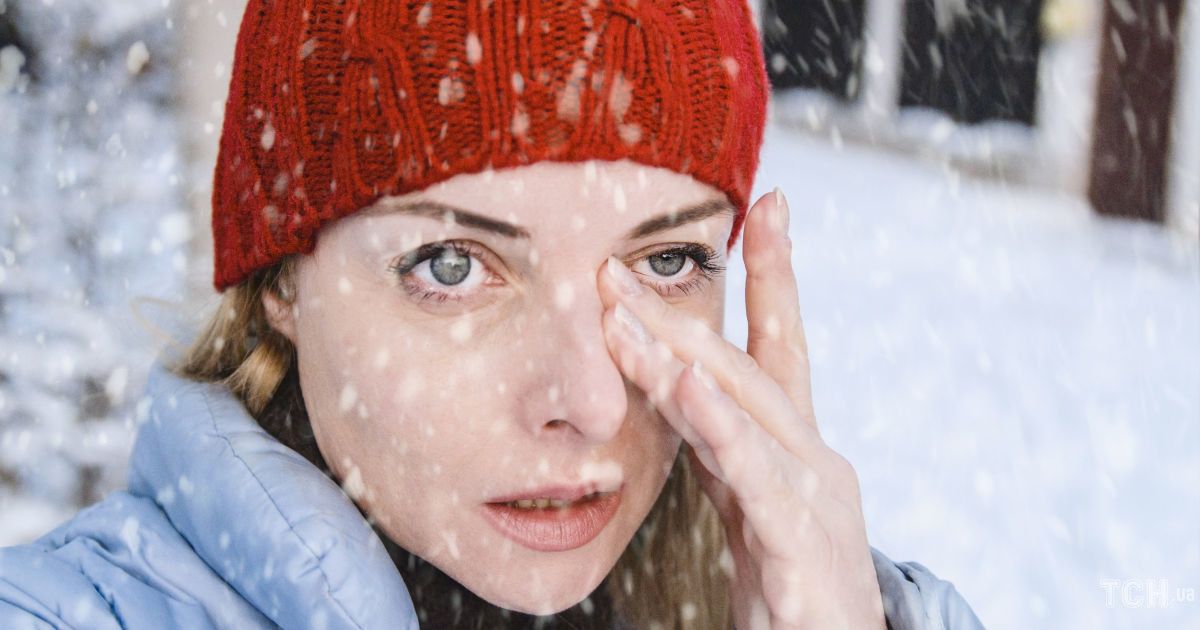Our eyes are protected by eyelids and eyelashes, they are constantly moisturized, so they are not afraid of the cold.
But sharp temperature changes, wind, dry air in rooms and cars worsen their work.
Exactly how, why and what to do about it, the
top-class ophthalmologist, ophthalmic surgeon, candidate of medical sciences, chief physician of the VISIOBUD clinic, Volodymyr Melnyk
, told .
Dry air and dry eye syndrome
The outer shell of the eyeball, or cornea, is covered with a thin tear film that nourishes the deep structures of the eye with oxygen and nutrients.
It protects the cornea from drying out, irritation, microtraumas, dust, exposure to allergens, foreign bodies, and pathogenic microorganisms.
Removes carbon dioxide and metabolic products.
For the normal functioning of the tear film, the mucous membrane of the eye must be sufficiently moistened.
In winter, when the air in residential buildings, workplaces and cars is dry, the tear film evaporates quickly, breaks prematurely and does not have time to renew itself in time.
This contributes to the emergence
of the "dry eye" syndrome
.
Symptoms of "dry eye" syndrome are:
excessive tearing;
redness of the eyeballs;
burning;
itching;
blurred vision;
feeling of a foreign body in the eye;
photophobia.
At the same time, clarity of vision deteriorates, concentration of attention and working capacity decrease.
How to prevent dry eye syndrome in winter
1. Blink: A minute of regular blinking renews about a quarter of the tear film
.
While working at a computer or other gadget, we hardly blink.
Because of this, the tear film does not have time to renew itself.
Take as a rule: work for 30-40 minutes - rest for 10-15 minutes.
You blink (the glands of the eyelids secrete a fatty component that protects the tear film from damage and evaporation), perform yoga for the eyes, lie with your eyes closed in a state of rest.
2. Use a humidifier to maintain the optimal level of humidity in the room
.
Normally, the air humidity in a residential or office space should not be lower than 40%.
And the air temperature is no higher than 24 degrees.
3. Ventilate the car every 1.5-2 hours
.
In winter, we turn on the interior heating in the car, and to warm up as quickly as possible - fast mode.
A sharp flow of warm but dry air accelerates tearing of the tear film.
In addition, we blink less often while driving because we concentrate on driving.
As a result, the eyes become dry and painful.
To avoid this, use a weak interior heating mode.
Air the car every 1.5-2 hours.
While the car is airing, you rest, move, blink, drink coffee or tea.
4. Use moisturizing drops with hyaluronic acid or lipids in the composition
.
They will help maintain a sufficient level of eye hydration during the working day.
Moisturizing drops are recommended for use by people who spend a lot of time at the computer and cannot always take a break to rest: programmers, copywriters, writers, etc.
5. Visit an ophthalmologist every year and as needed
.
Itching and redness of the eyes, which are symptoms of the "dry eye" syndrome, can also signal the occurrence of an allergy or the development of an infection.
Tearing is a sign of increased sensitivity of the cornea, impaired patency of the nasolacrimal duct, allergies.
The ophthalmologist prescribes the necessary drops exclusively based on the results of the examination.
And that's why they are safe for health and give the expected result, unlike those prescribed independently.
A few more useful tips for eye health
Wear sunglasses in winter
.
Strong gusty wind dries the tear film, contributing to its damage.
Sometimes it can injure the cornea because it carries microparticles of street dirt.
For example, crystals of pebbles and sand.
In sunny weather, glasses protect the eyes from ultraviolet rays.
In winter, UV rays reflect off snow and glass surfaces and can cause corneal burns in case of prolonged exposure.
Do not rub your eyes with dirty hands
During the day, hands come into contact with the phone, keys to the apartment, cash, and doorknobs.
All these objects have microorganisms that temporarily inhabit our hands.
And they live there until we wash them off with running water and soap.
When we rub our eyes with dirty hands, we can introduce these microbes into them and cause the development of conjunctivitis or barley.
Active rubbing of the eyes, which is a habit, also damages the cornea - it thins.
Itching can be caused by "dry eye" syndrome, allergies, overstrain of the eye muscles, incorrectly selected contact lenses.
If it bothers you, seek help from an ophthalmologist to solve the problem.
Monitor the level of fluid consumed
Drink at least two liters of water a day and be sure to eat foods rich in vitamin A (carrots, legumes, bell peppers, spinach) every day.
The chief doctor of the VISIOBUD clinic is Vladimir Melnyk
Take care of your vision and be healthy!
Read also:
How a blackout affects vision: we remove the excess load from the eyes
How stress affects the eyes and how to prevent it: the doctor explains
What spoils your vision: books, gadgets or the sun
